General
Prof. Sachs Expresses Optimism about Africa’s Economic Growth, PDMs Success
Published
2 years agoon
By
Mak Editor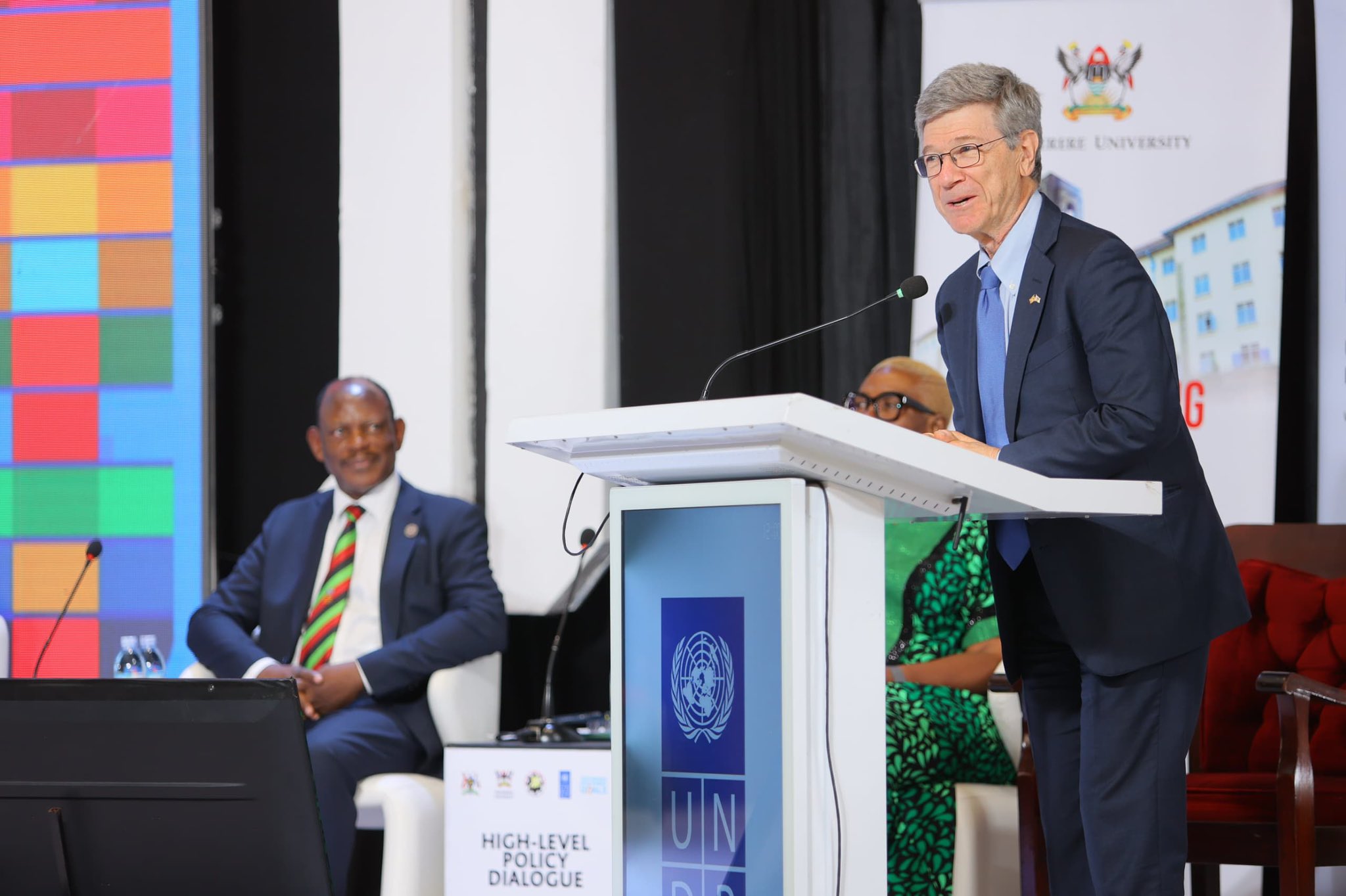
The Government of Uganda has been called upon to put in place measures to ensure the effective implementation of the Parish Development Model (PDM) programme. The call was made at a High-Level Policy Dialogue organized by the United Nations Development Programme (UNDP), in partnership with the Office of the Prime Minister (OPM), National Planning Authority and Makerere University.
Hosted by Makerere University on Wednesday 28th February 2024 at the Yusuf Lule Central Teaching Facility Auditorium, the Dialogue was based on the theme “Accelerating the Sustainable Development Goals through leveraging Innovating Financing, the Parish Development Model, and Science and Technology”. During the dialogue, the government was urged to set up institutions that can track the usage of the program funds to ensure that the over Shs1 Trillion pumped into the program annually does not go to waste.
This call was made by Prof Ezra Suruma, the Chancellor Emeritus of Makerere University and Uganda’s former Minister of Finance, who was a panelist at the dialogue. Hon Suruma warned that currently, it is difficult to assess the achievements of PDM since there is no clear monitoring of the projects at the parish level where the money is being invested.
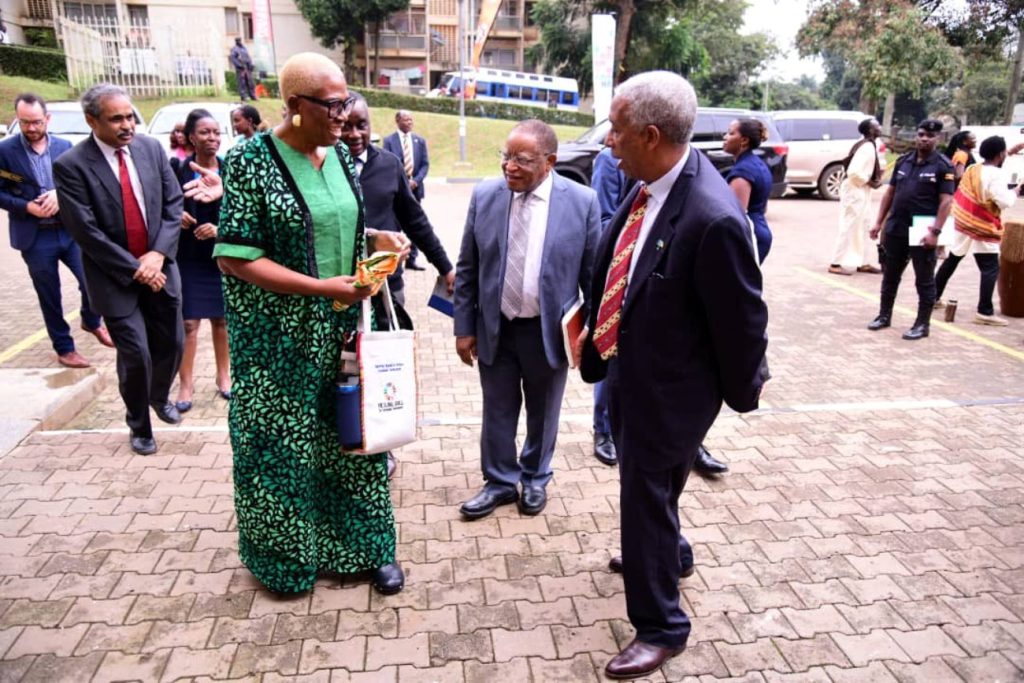
“In Uganda, we are investing Shs 1 Trillion in the 10,594 parishes, but if you ask where it is going, you can’t find it. The PDM money is capital that the government is attempting to invest in our country and that capital is supposed to accumulate over time. If we invest Shs1 Trillion this year, next year we should have more than that,” Prof. Suruma said.
The Chancellor Emeritus as such, called for the establishment of an institution that can trace where the PDM funds are being invested so that this money is treated as an investment and not consumption.
Minister for Local Government Hon Raphael Magyezi however, assured Prof Suruma and the audience that implementation of the PDM program is highly monitored and leakages are extremely minimal. This, he said, was because the government decided to digitalize payments of the PDM money directly from the Treasury to the parish-based SACCOs. Furthermore, he noted that Government has put in place the PDM Management Information System (MIS) in line with the Sustainable Development Goals (SDGs) emphasis on data for development.
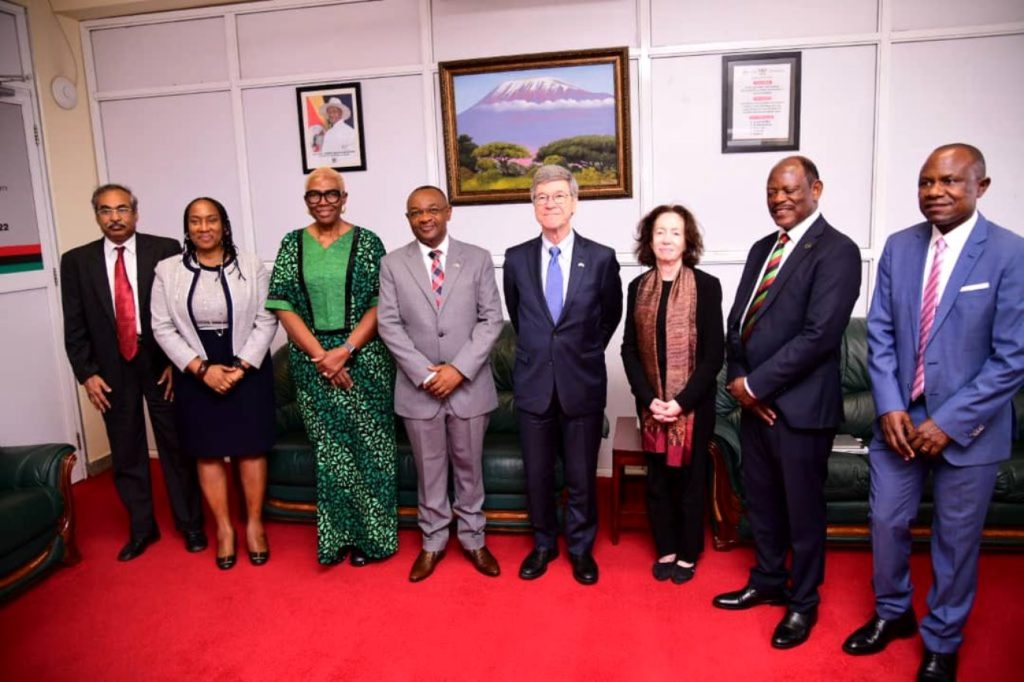
“We have developed our own Management Information System so that we know which household is actually in subsistence, and we have parameters for that, and we are able to monitor and evaluate our programme based on a tracker system” Hon. Magyezi explained.
The Minister further noted that PDM targets 8.9 million households in Uganda, 39% (3.4 million) of which are still engaged in subsistence, with 1 million of these reached so far. He admitted although the PDM still has its work cut out, the Government is proud of the progress so far. Hon. Magyezi shared that Uganda has 145 establishments at the level of Local Council 5 consisting of 135 Districts and 10 Cities, 2,284 Sub-Counties to supervise the parishes and under the parishes, 70,626 villages.
The Prime Minister, Rt. Hon. Robinah Nabbanja who was Chief Guest at the lecture shared that PDM is the Government of Uganda’s second key strategy for accelerating the SDGs and commended the Model as a “comprehensive strategy to uplift the incomes and welfare of all Ugandans.” The first key strategy is Leveraging Innovative Financing Mechanisms, while the third is putting more focus on Science, Technology and Innovation.
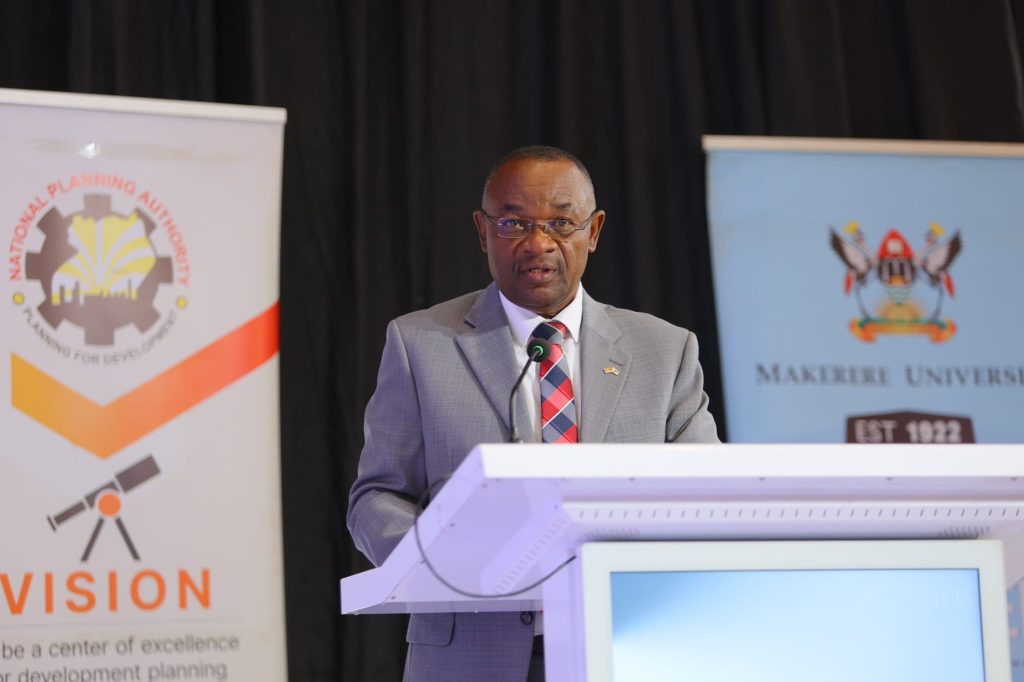
Rt. Hon. Nabbanja highlighted the government’s commitment to harnessing the power of research and innovation to provide a strong foundation to advance the digital agenda. She added that the PDM Laboratory at Makerere gives the University an opportunity to amplify and support efficiency and effectiveness of the programme’s implementation.
“Therefore, the PDM Laboratory should continue to be a platform for 1) Distilling and providing additional insights, 2) Commissioning further research and enquiry on the basis of information provided by the technical units and feedback and 3) Analyse feedback to test out policies and operational issues for Cabinet to take action” remarked the Prime Minister.
She informed the audience that Prof. Jeffrey Sachs is leading similar efforts with a lab at Columbia University and urged the leadership of Makerere University to establish a collaboration with Columbia University, “and I’m sure Prof. Sachs is much willing to support this”.
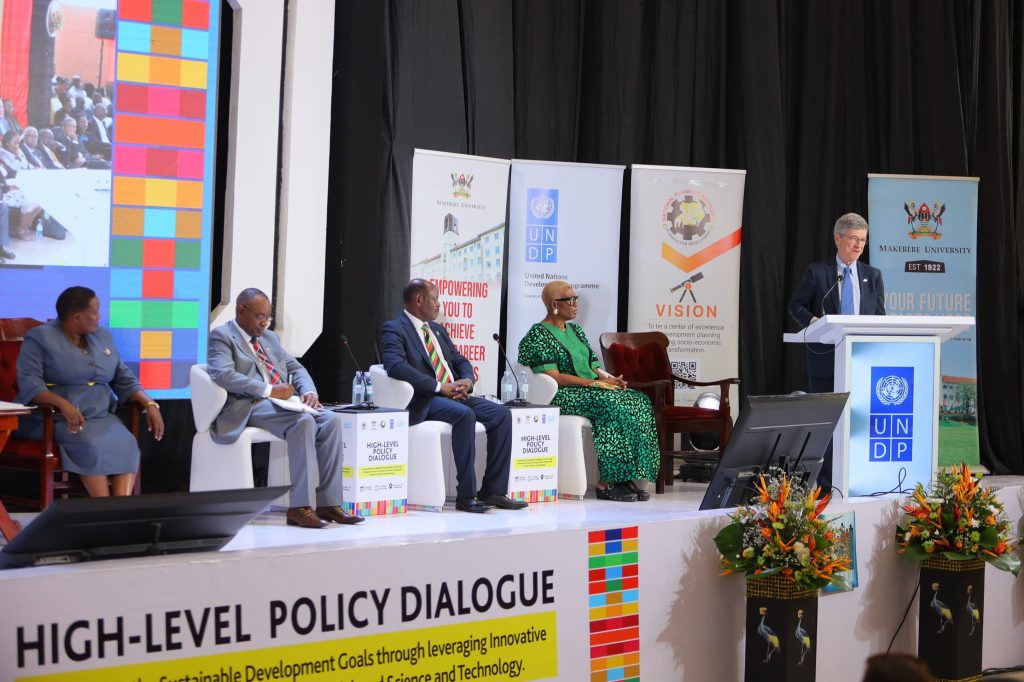
Professor Jeffrey Sachs, a world-renowned Economist, leader in sustainable development, and senior UN advisor delivered a keynote address in which he expressed optimism about development prospects on the African continent.
The prolific economist and author, projected that Africa would take off and become a global economic force in the next 40 years if it could find ways of uniting into a single economic block.
Citing China and India Prof. Sachs advised the government to set targets and also set instruments to help achieve these targets, if the country is to achieve the SDGs. The simple idea of “targets and instruments” was developed by Nobel Prize Laureate Jan Tinbergen. Tinbergen was awarded the first Nobel Prize in Economics in 1969 together with Ragnar Frisch.
Prof. Sachs defined Sustainable Development as the result of achieving four difficult objectives namely; Material wellbeing for everybody, Social inclusion, Environmental Sustainability, and Peace and Cooperation. He nevertheless shared that these can be achieved by Tinbergen’s “targets and instruments” idea.
He advised Uganda to copy China and invest in six major types of capital namely; Education, Infrastructure, Massive Interconnected Infrastructure, Protecting Natural Capital such as clean energy sources, Intellectual/Science and Technology Capital as well as Business Capital. On financing, he advised the government to find flexible and low interest financing with 40 year maturity if it is for sectors such as education.
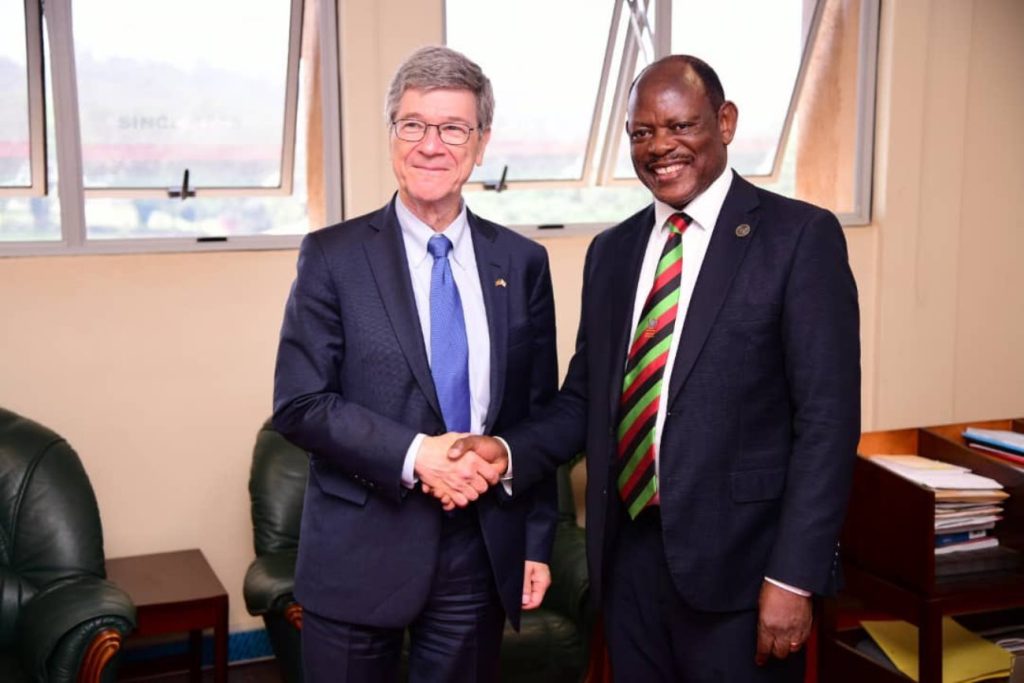
“What I want to promise you, though I can’t give you the final answer for that part of innovative financing, we are going to get it done. Uganda is going to show a strong NDP IV, it is going to show a very robust plan to achieve rapid growth over the next 40 years, it is going to show that that rapid growth easily repays any long-term low-interest loans that have taken to achieve that, it is going to make the case that the Parish Development Model proves the last mile in an ingenious way, and that institutionally this country is poised for the breakthrough that we are talking about at the regional, national and local level” Prof. Sachs summed up.
In her remarks, Ms. Nwanneakolam Vwede-Obahor, the UNDP Resident Representative warned of Uganda’s widening development financing gap, standing currently at 33 trillion shillings (US$ 8.8 billion) annually.
“Traditional financing sources such as domestic taxes, Overseas Development Assistance (ODA), concessional loans from external partners, borrowing from the domestic market and foreign direct investment are not enough to finance the SDGs,” she said.
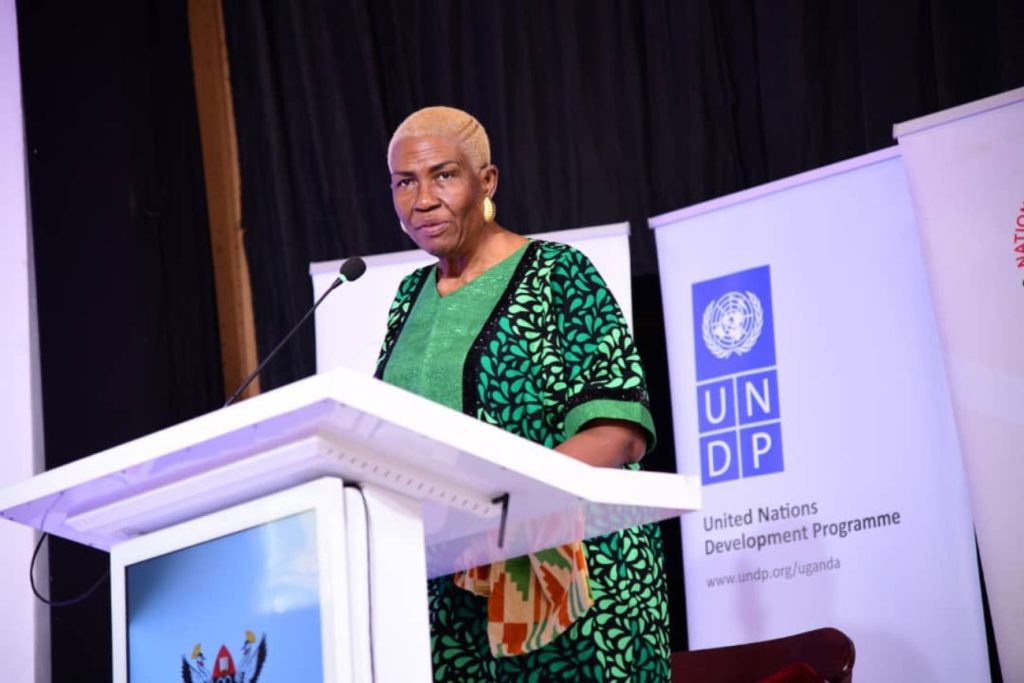
“Uganda must explore alternative avenues to secure affordable and flexible financing to drive the development phase in the next seven years. This will involve continuous alignment of the budget allocations and development plans with SDG priorities, diversifying funding sources, including public-private partnerships and unlocking new innovative financing models, and enhancing financial resilience.”
The dignitaries, accompanied by the Vice Chancellor, Prof. Barnabas Nawangwe, toured the state-of-the-art Innovation Pod, which is poised to drive innovation and research in the country. In his remarks, the Vice Chancellor said that Makerere remains focused on implementing strategies and programmes under SDG 4 which emphasizes Quality Education. “I am therefore pleased that today, as we continue the implementation of Sustainable Development Goals, Makerere University is on board hosting Prof. Jeffrey Sachs, the Office of the Prime Minister, National Planning Authority, UNDP, and a number of stakeholders to enhance the discussion on leveraging innovative financing, the parish development model and science and technology.”
Prof. Nawangwe shared with the audience, Makerere’s readiness to contribute to the success of the PDM, citing the role of the PDM Policy lab headed by Prof. Eria Hisali. The PDM Policy lab conducted capacity building to sensitise low-income earners about government programs and how they can utilize the funds to improve their standards of living. The lab continues to undertake research on how to effectively implement PDM. The Vice Chancellor equally shared Makerere University’s commitment to undertaking research and programmes aimed at ensuring that health becomes a priority on the global agenda through the Centre of Excellence for Sustainable Health (CESH). Established in partnership with the Karolinska Institute, Sweden, CESH’s core activities include; Capacity development and Education, Tools and resources, Networks and partnerships, and Research.
You may like
-


Meet Najjuka Whitney, The Girl Who Missed Law and Found Her Voice
-


Makerere University School of Public Health Graduates First Cohort of Cost-Effectiveness Analysis Short Course
-


Climate variability found to shape malaria trends in Yumbe District
-


Mak hosts First African Symposium on Natural Capital Accounting and Climate-Sensitive Macroeconomic Modelling
-


Uganda Martyrs Namugongo Students Turn Organic Waste into Soap in an Innovative School Project on Sustainable Waste Management
-


Strengthening Global Partnerships to Advance Research, Innovation, and Graduate Training: Makerere University Hosts Delegation from the University of Warwick
General
Mak Selected to Host Alliance for African Partnership Africa Office
Published
12 hours agoon
February 23, 2026
Makerere University has been selected to host the Africa Office of the Alliance for African Partnership (AAP). The significant milestone that underscores Makerere’s role in fostering research, innovation, and global collaborations across the continent was announced at a meeting of the University’s Central Management with an AAP delegation on 23rd February 2026.
Makerere’s selection was based on the University’s robust commitment, alignment with the AAP’s Strategic Plan, and proven ability to manage consortium activities. The AAP, which was initiated by Michigan State University (MSU) in collaboration with Ten African Universities and agricultural policy research networks in 2016, targets critical challenges in education, youth empowerment, health and nutrition, agri-food systems, science and technology, water, energy, environment, and culture and society.
Addressing the delegation consisting of AAP Co-Directors from MSU, Dr. Jose Jackson-Malete and Dr. Amy Jamison, accompanied by newly-appointed Director of the AAP Africa Office, Dr. Racheal Ddungu Mugabi and Ms. Clare Cheromoi, the Vice Chancellor, Prof. Barnabas Nawangwe who appreciated the choice of Makerere to host the Africa Office said:
“One of the greatest challenges facing African universities is PhD training, particularly supervisory capacity. Through partnerships such as the Alliance for African Partnership we can leverage international expertise to strengthen supervision—whether through training supervisors or through joint supervision arrangements.”
Prof. Nawangwe equally applauded joint initiatives such as the Grant Writing and Publication project, which gave rise to the establishment of a Writing Centre that he said can be used to build capacity in AAP member universities with Makerere as the hub. Officially launched on 21st March 2023, the project is living up to its expectation of becoming a springboard for strong postdoctoral collaborative research for both institutions and other US universities.
Dr. Titus Awokuse, Vice Provost and Dean for International Studies and Programs at Michigan State University (MSU) who attended virtually, reiterated that Makerere’s selection reflects its long-standing commitment to advancing African higher education, research excellence, and meaningful global collaboration.
Reflecting on the origins of the Alliance for African Partnerships (AAP), Dr. Awokuse explained that nearly a decade ago, MSU initiated a transformative conversation in Atlanta centered on the question: How should we partner differently? From this dialogue emerged AAP—an Africa-centered consortium that now brings together 12 institutions across Africa and the United States.

He emphasized that AAP is grounded in equity, mutual benefit, shared leadership, and deep respect for African priorities and expertise. Since its founding, MSU has served as convener and key supporter, working with member institutions to strengthen research collaboration, promote faculty and student engagement, and address shared development priorities.
Dr. Awokuse underscored that AAP’s success is the result of collective vision and commitment, not the efforts of a single institution. He paid tribute to Lilongwe University of Agriculture and Natural Resources for hosting the Africa Office in its early years and acknowledged the foundational leadership of the inaugural Africa Office Director.
He described the launch of the Africa Office at Makerere University as a significant milestone that reinforces Africa-led leadership, strengthens regional collaboration, and enhances responsiveness to emerging opportunities. MSU, he affirmed, remains fully committed to AAP and to working closely with Makerere and all consortium partners to expand collaborative research, nurture the next generation of scholars, and advance Africa-led solutions to global challenges.
The newly-appointed AAP Africa Office Director, Dr. Racheal Ddungu Mugabi is a member of faculty in the Department of Development Studies, Institute of Gender and Development Studies. Her work on intersectional inequalities in Uganda and other Global South regions uniquely positions her to drive collaborative research and partnerships at the Africa Office.
Initially founded by ten African Universities and MSU, AAP now comprises eleven African members including; the African Network of Agricultural Policy Institutes (ANAPRI)-Zambia, Egerton University-Kenya, Lilongwe University of Agriculture and Natural Resources (LUANAR)-Malawi, Makerere University-Uganda, United States International University-Africa-Kenya, Universite Cheikh Anta Diop-Senegal, Universite Yambo Ouologuem de Bamako-Mali, University of Botswana-Botswana, University of Dar es Salaam-Tanzania, University of Nigeria, Nsukka-Nigeria, and the latest, University of Pretoria-South Africa.
These Universites collaborate under Focal Points to advance policy-relevant research and sustainable development. Makerere University’s Focal Point is Prof. Robert Wamala, Director of Research, Innovations and Partnerships (DRIP).
Addressing the University Management, Dr. Jackson-Malete outlined the African Futures Research Leadership Program, which nurtures early career scholars through mentorship and skill-building as one of AAP’s flagship programs. She noted that the Program that prioritizes female participants or men committed to promoting women in higher education has for the first time during its fifth cohort admitted the first male, Dr. Alfadaniels Mabingo from the Department of Performing Arts and Film, Makerere University.
The AAP Africa Office at Makerere will coordinate activities, boost research collaboration, mobilize resources, and enhance global engagements for socio-economic transformation. This aligns with Makerere‘s broader goals of leveraging international expertise to build resilient institutions.
View more photos from the event: https://flic.kr/s/aHBqjCLjoA
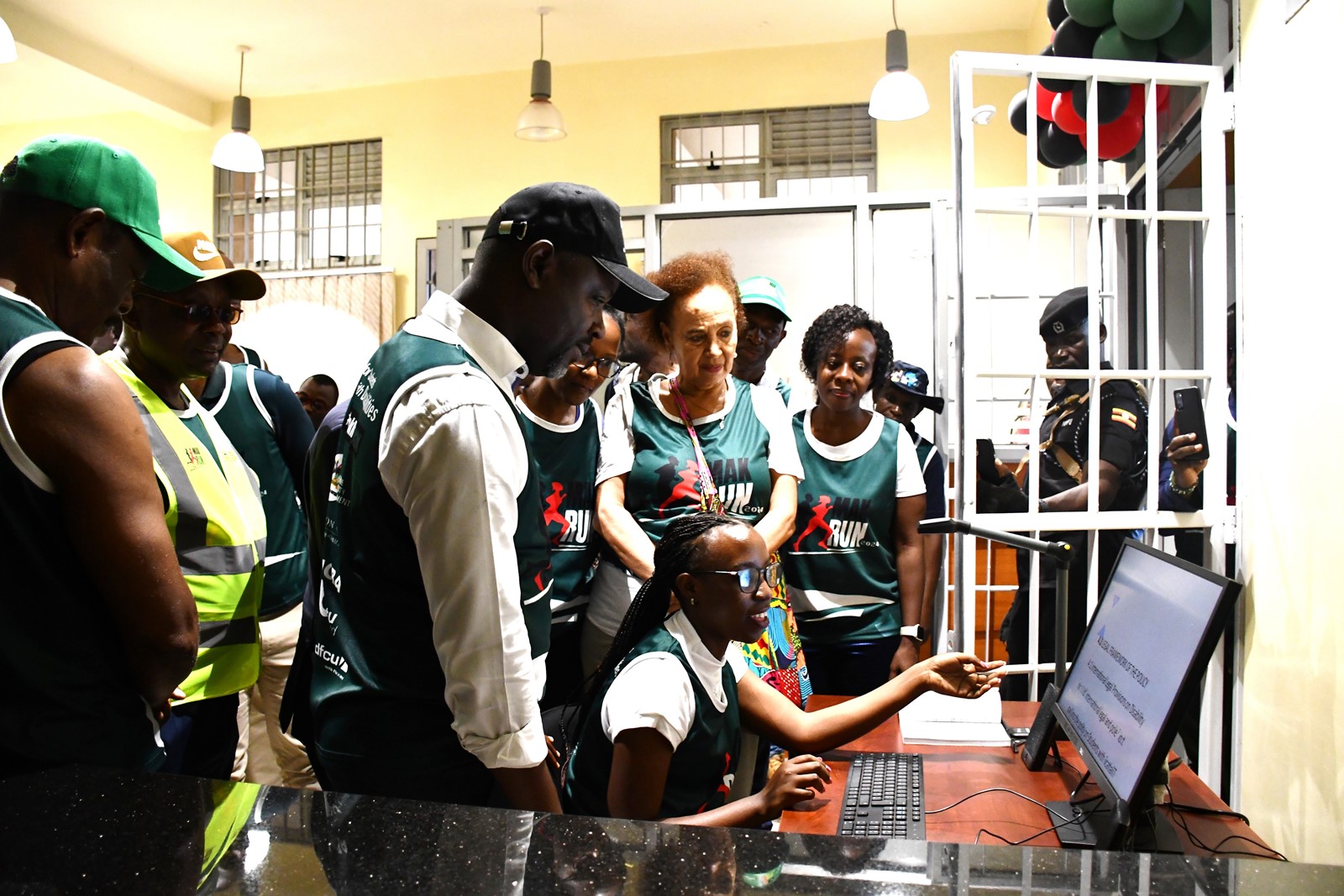
Students with disabilities at Makerere University have been requested to stop seeking for special attention and instead look for solutions and opportunities for personal growth.
This was during a mental wellness, inclusion and safeguarding session organized by the Dean of Students office and the Mastercard Foundation Scholars Program at Makerere University.
Addressing students on mental health and disability inclusion, Mr. Marvin Ggaliwango, a lecturer at the College of Computing and Information Sciences (CoCIS), noted that if the students stop complaining, they will become empowered to take charge of their own development, build resilience and engage confidently in both academic and social environments.
“Turn your lived experiences into tools for innovation. Stop complaining and start creating solutions for yourselves. You are the one living this life, and that gives you the authority to be an expert. When you develop a solution, it doesn’t just benefit you, it helps others too, by removing barriers,” Mr. Marvin Ggaliwango, said.
He encouraged students to see themselves not as victims of circumstance, but as active participants and co-creators of the inclusive environment they wish to experience.
“Learn how to communicate effectively and humbly. If you have a problem, express yourself clearly. Do not isolate yourself or feel resentful. You are not defined by disability, you may face disadvantages, but you still have ability,” he encouraged.
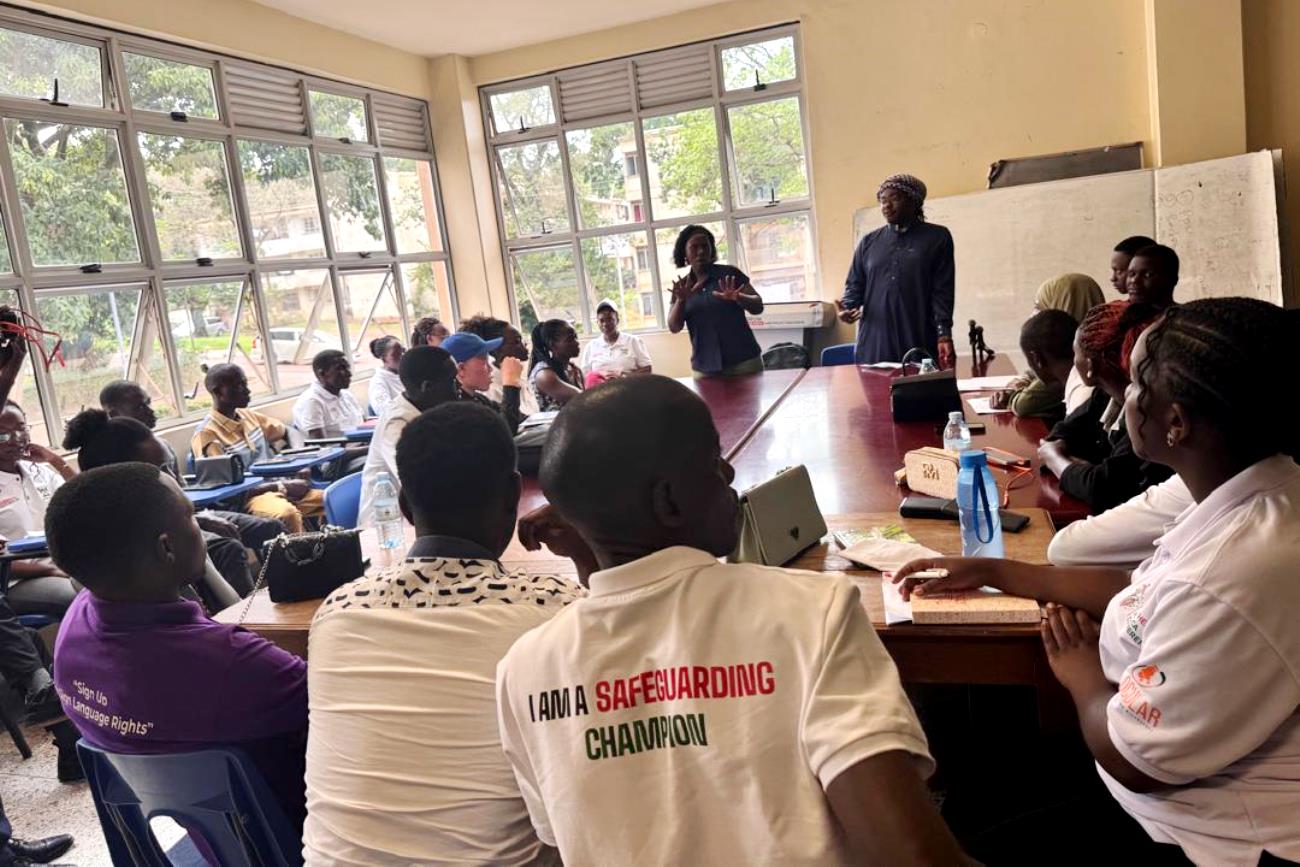
Throughout the session, students listened attentively as he emphasized the importance of self-awareness and personal responsibility, urging them to understand their strengths, acknowledge their limitations and take deliberate steps toward personal growth while contributing positively to the University community.
“We must enhance and ensure that our mental health is number one. Always choose yourself first. Choose what makes you happy and protect your peace. If you are at peace with yourself, your academics will improve. There is a strong link between mental wellness and academic success,” Mr. Ggaliwango, noted.
In his speech, Mr. Musa Mwambu, the Disability Inclusion Advisor at Light for the World Uganda, called upon the students with disabilities to enhance and ensure that their mental health is prioritized.
“As students living with disabilities, sometimes you over expect, because you have a disability you should be given, listened to and when people do not listen to you, you attribute it to your disability, get it from me, even those without disabilities are not listened too. Things are not happening to you because of your disability it is because of the world we live in. Everything that happens to you can happen to others,” Mr Mwambu, noted.
“Have fun with your life. Make yourself happy and be smart. Present yourself in public confidently wherever you go. The way you carry yourself can improve your mental health and how others perceive you,” Mr. Mwambu said.
He reminded the students that gaining admission to Makerere is itself a milestone.
“There are many people without disabilities who have never stepped at Makerere University. Find something that empowers you and hold on to it. You may have a physical impairment, but if you are brilliant in class, you can lead discussions and inspire others,” he added.

During the session, Dr. Rodney Rugyema, the Acting Principal Warden, welcomed the students back from the long holiday. He assured them that the University is committed to their safety and well-being while on campus.
Dr. Rugyema emphasized that the University has systems in place to protect students, both physically and psychologically and encouraged them to report any concerns promptly.
“When you are at the University, you are not on your own, we are always here for you. For us to engage you on mental wellness and inclusion, we want you to be in the right state of mind, whole and complete,” Dr Rugyema, said.
He added: “We are here to empower you and we are calling upon you not be a risk for yourself and always be able to detect risks that are likely to affect your mental health and works towards avoiding them and reporting them to ensure that the University manages them before they escalate into real harm whose impact is more serious than you can think,”
During the session, Ms. Diane Nabikolo Osiru highlighted the University’s broader commitment to safeguarding.
Safeguarding at Makerere University refers to measures put in place to promote safety and wellness of all students, staffs and other stakeholders.
“At Makerere University, safety is not a luxury for few. but it is a right for every student. As the semesters begins, we are urging you to learn how to identify signs of harm or abuses and report them to the appropriate safeguarding contact points,” Ms Nabikolo, said.
For support in case of any harm or abuse, International and Refugee Students, can access support through the Advancement and International Office, while Students with Disabilities, can utilize the Disability Support Center. Those with personal and emotional challenges, can visit the Counselling and Guidance Centre.
In his speech, Dr Joab Agaba, a Lecturer in the College of Computing and Information Sciences, guided students how to report risks and incidences to the MakSafeSpace, the e-reporting platform complimenting the other University traditional reporting channels.
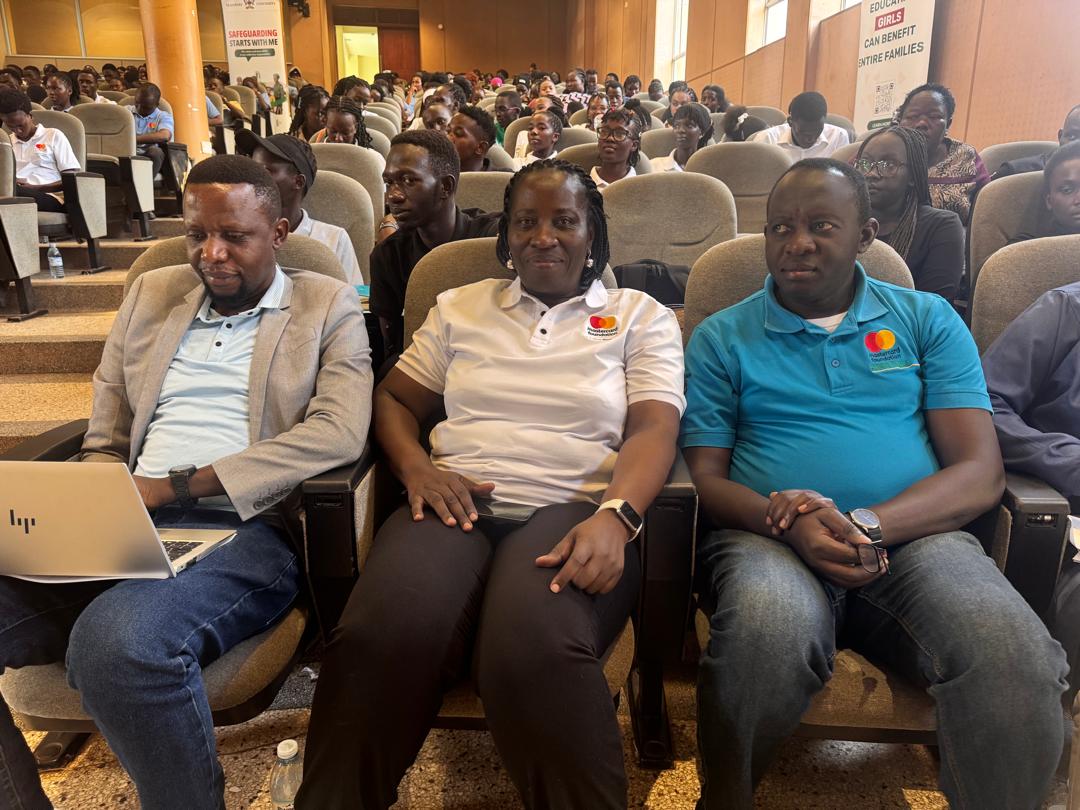
Mr. Henry Nsubuga, the Manager of the Counselling and Guidance Center, shared practical strategies for coping with stress effectively including time management, setting realistic goals, seeking support from peers or counsellors.
Students speak out
Shanitah Nahamya, 2nd year student of the Bachelor of Adult and Community Education
“I have learned how to respectfully and appropriately engage with students with disabilities. In the past, I often felt pity when I encountered them, but now I understand that what they need is not pity, it is respect, support, and equal opportunity.”
Guo Dorothy Geri, 1st year student of the Bachelor of Commerce
“I have learnt how to use inclusive language. Before offering help to a student with a disability, I will first ask them, because not all the time do they need our help. You might think someone wants to be helped to cross the road, yet they are waiting for someone.”
Valentines Doris Aduka, 1st Year student of the Bachelor of Biomedical Science
“I have been calling students with disabilities special names, thinking it was kind. But I have learned that they do not want to be treated differently or labeled in a special way. What they value most is being treated like everyone else, with respect, dignity, and fairness.”
General
Strengthening Global Partnerships to Advance Research, Innovation, and Graduate Training: Makerere University Hosts Delegation from the University of Warwick
Published
5 days agoon
February 19, 2026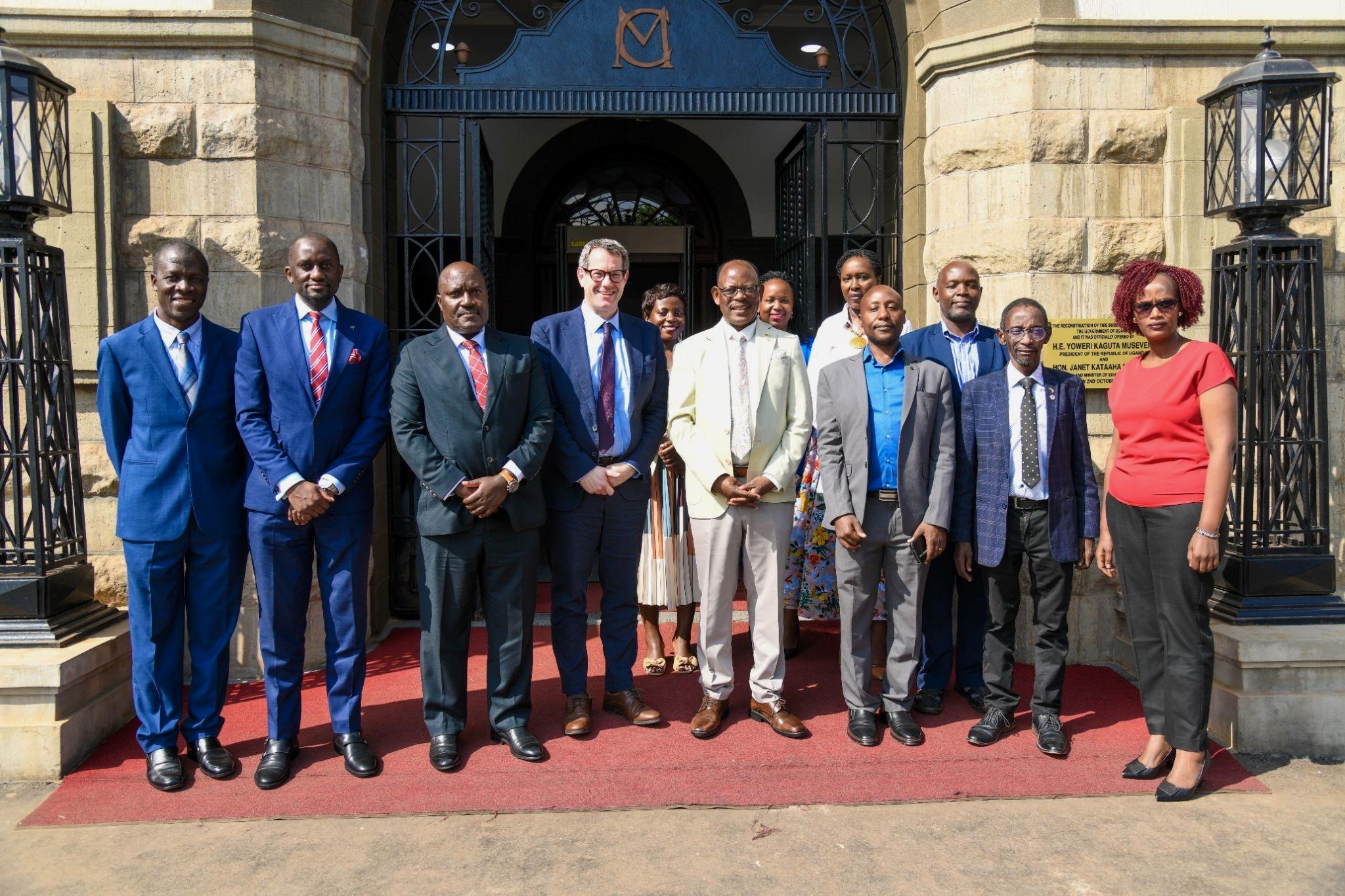
Makerere University continues to deepen its global engagement agenda through strategic partnerships that enhance research, innovation, and graduate training. On Friday, 13th February, 2025, during a recent engagement with a delegation from the University of Warwick (UK), university leaders, researchers, and administrators explored potential collaborations to address pressing development challenges and strengthen institutional capacity.
Expanding Collaboration in Research and Innovation
Welcoming the delegation, Prof. Fred Masagazi-Masaazi, Chairperson of the Makerere University Research and Innovations Fund (Mak-RIF) Grants Management Committee, emphasized the growing dialogue between Makerere University and the University of Warwick. He noted that ongoing discussions are focused on resource mobilization to support research and innovation, as well as building sustainable academic exchanges for both staff and students.
Dr. Roy Mayega, Mak-RIF Coordinator, together with Mrs. Phoebe Lutaaya Kamya, Deputy Coordinator, and members of the Mak-RIF team, highlighted the Fund’s role in catalyzing collaborative research and strengthening partnerships that translate research into societal impact.
Mr. Simon Kizito, Deputy University Secretary, outlined key areas identified for collaboration, including joint research and innovation initiatives, benchmarking visits across disciplines such as law, science, and ICT, and student exchanges designed to strengthen applied research skills. He also pointed to opportunities for training Makerere staff in specialized areas such as tropical diseases and innovation ecosystems, drawing lessons from Warwick’s strong linkages with industry partners located within its campus.
Makerere’s Strategic Priorities and Global Role
In his remarks, the Vice Chancellor underscored the longstanding relationship between Makerere University and the University of Warwick, dating back to the early 1980s, initially through staff training and more recently through collaborative research.
He highlighted Makerere’s historic contribution to leadership development across Africa and beyond, and the University’s continued growth following faculty rebuilding efforts in the 1980s, which have strengthened its research capacity. Today, Makerere has over 1,300 academic staff, more than 1,000 of whom hold PhDs, positioning the institution to play a leading role in knowledge production.
The Vice Chancellor also outlined major thematic areas where partnerships are critical:
- Climate change and food security: Researchers at the College of Agricultural and Environmental Sciences (CAES) are developing drought-resistant and high-yield seed varieties to address changing weather patterns and food insecurity.
- Public health and infectious diseases: Uganda faces frequent outbreaks of diseases such as Ebola and Marburg, and Makerere has built strong capacity in outbreak response and tropical medicine. The University’s medical school and the Infectious Diseases Institute (IDI) continue to play a pivotal role in research and treatment.
- Peace and conflict studies: Through initiatives such as the Rotary Peace Centre, Makerere contributes to training global leaders in conflict resolution.
- Climate-sensitive macroeconomic modelling: Makerere recently hosted a conference in collaboration with the Ministry of Finance, Planning and Economic Development to advocate for climate-responsive macroeconomic modelling and to plan for the establishment of a Centre of Excellence in this field.
- Innovation and technology: The University’s innovation ecosystem has produced notable outputs, including Africa’s first electric vehicle and ongoing work to expand incubation facilities to enable students to graduate with viable enterprises.
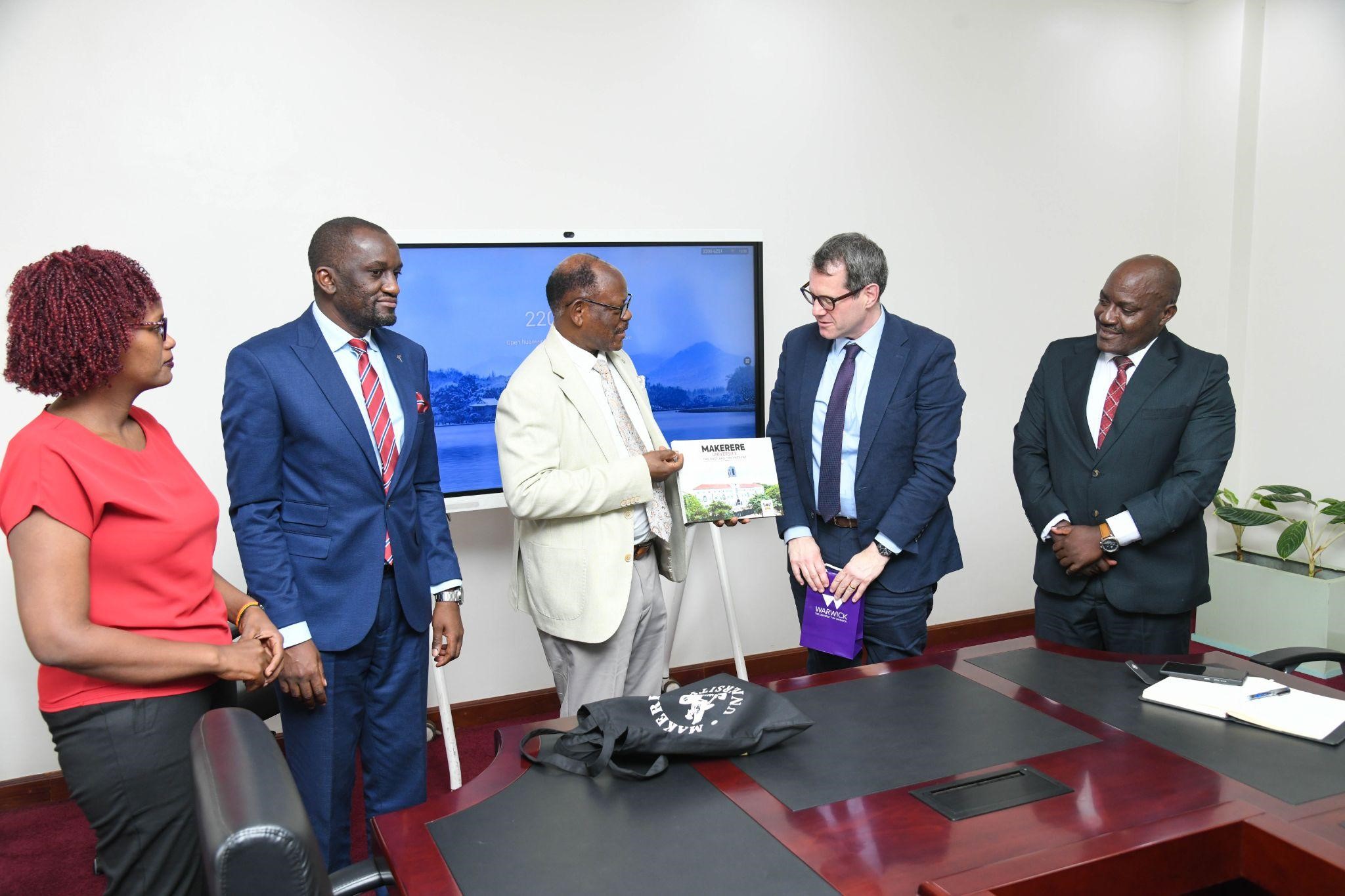
The Vice Chancellor emphasized that addressing youth unemployment remains a central priority, noting that innovation, entrepreneurship, and graduate training are essential to building stable societies.
He further stressed the importance of expanding graduate education. Africa currently produces a small proportion of global research output, and increasing PhD and Master’s training supported by international partnerships remains critical to accelerating knowledge production and development outcomes.
Internationalization and Shared Learning
Speaking on behalf of the University of Warwick, Professor Daniel Branch, Deputy Vice Chancellor, reflected on Warwick’s own institutional journey, noting that its growth has been driven by a strong focus on internationalization, innovation, and research. He expressed Warwick’s commitment to building productive partnerships with African universities, including Makerere, to advance joint research, training, and innovation.
Professor Branch also highlighted the importance of university-industry linkages, citing examples such as collaborations with major manufacturing firms that provide practical training opportunities and inform curriculum development.
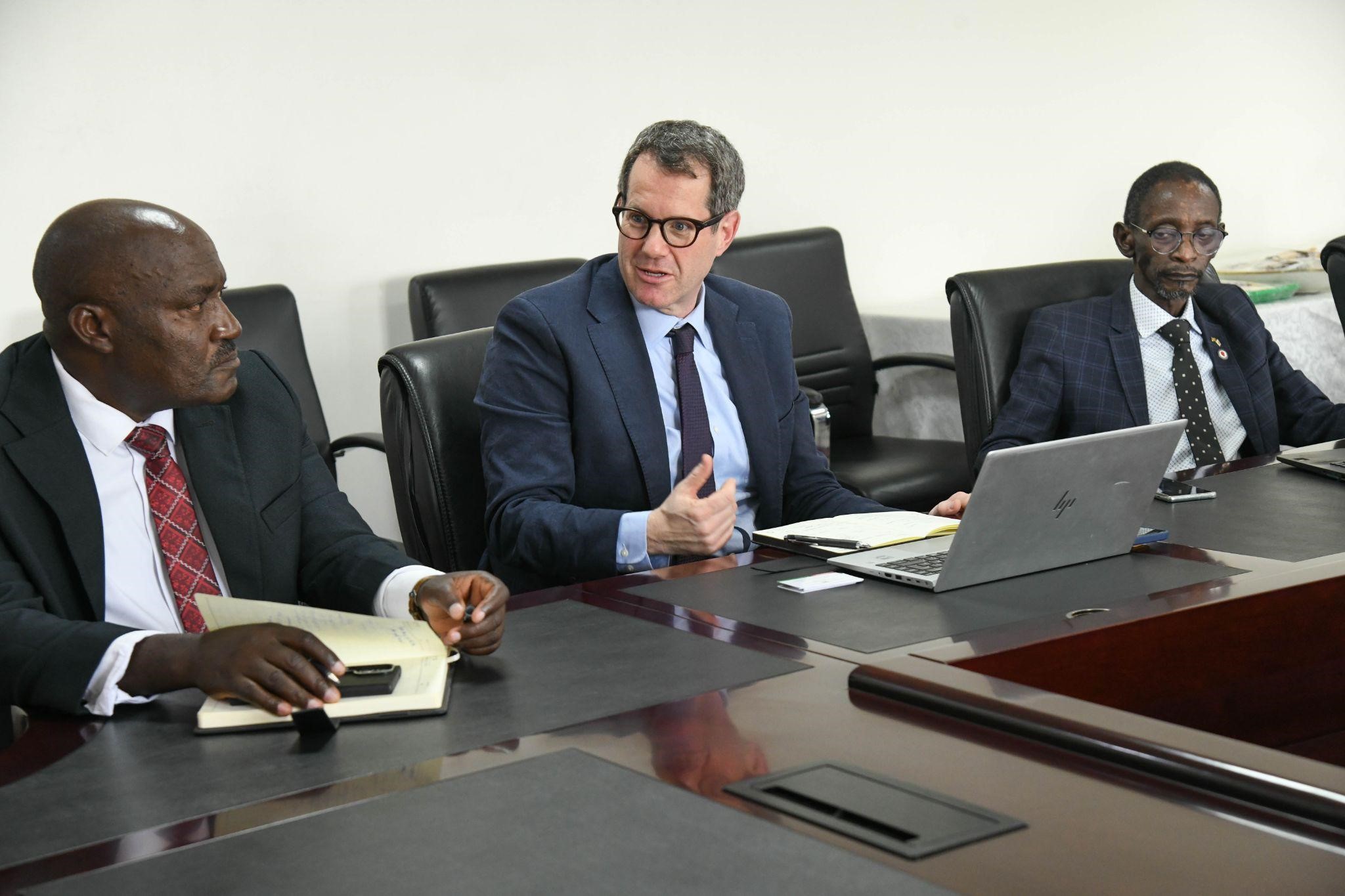
Showcasing Research and Innovation at CEDAT
A second session of the engagement was held at the College of Engineering, Design, Art and Technology (CEDAT), where academic leaders and researchers presented ongoing work across multiple disciplines.
Presentations included:
- Development of a solar water pump through reverse engineering (Dr. Edmund Tumusiime)
- Crane Cloud, a locally developed cloud-computing platform (team from the College of Computing and Information Sciences)
- Profiling gaseous emissions associated with burnt bricks (Dr. Nathan)
- Integration of centralized grid and decentralized renewable off-grid systems: a techno-economic analysis (Dr. Abubaker Waswa)
- Innovation and digitalization pathways for affordable housing in Sub-Saharan Africa (Prof. Stephen Mukiibi)
The session was attended by CEDAT leadership, including the Principal, Prof. Moses Musinguzi, as well as deans and heads of department from engineering, built environment, and industrial and fine arts. The day’s activities were concluded with a tour of Makerere University’s Innovation Hub.
The engagement reaffirmed Makerere University’s commitment to building strong, mutually beneficial partnerships that accelerate research, strengthen graduate training, and drive innovation. As global challenges such as climate change, public health threats, and youth unemployment intensify, collaboration among universities remains essential to developing scalable, evidence-based solutions.
Through partnerships such as the one Makerere University and the University of Warwick hope to activate through a Memorandum of Understanding in the near future, Makerere continues to position itself as a leading research-intensive university dedicated to transforming society through knowledge, innovation, and global cooperation.
Caroline Kainomugisha is the Communications Officer, Advancement Office, Makerere University.
Trending
-

 General2 weeks ago
General2 weeks agoAptitude Exam (Paper 1) Results for the Mature Age Entry Scheme 2026/2027
-

 Health5 days ago
Health5 days agoUganda has until 2030 to end Open Defecation as Ntaro’s PhD Examines Kabale’s Progress
-

 General5 days ago
General5 days agoMastercard Foundation Scholars embrace and honour their rich cultural diversity
-

 General2 weeks ago
General2 weeks agoFor Youth by Youth – Call for Second Cohort Applications
-

 Agriculture & Environment4 days ago
Agriculture & Environment4 days agoUganda Martyrs Namugongo Students Turn Organic Waste into Soap in an Innovative School Project on Sustainable Waste Management
